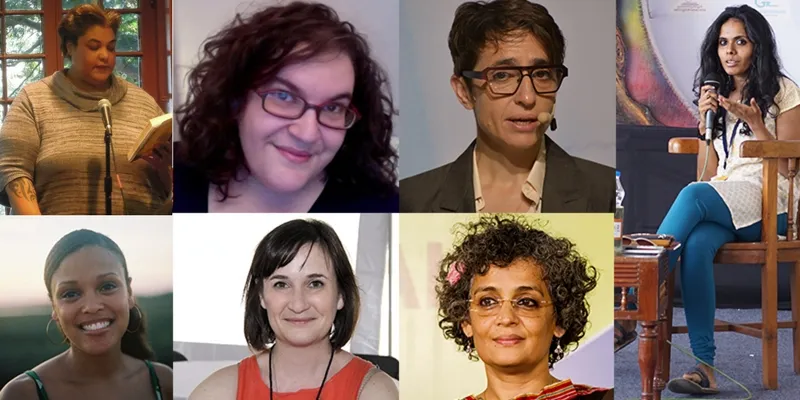Meet the women authors who pushed the boundaries of conversation in 2017
Although the pages of 2017 are slowly rustling towards an end, this passing year has created new spaces for several women authors across the world. Crafting realities of everyday life, be it in fiction or non-fiction, politics or technology, the women authors of today have left no stone unturned to make their voices heard.
Let’s look at some of the women from India and across the globe who shed light on subjects that matter and need all our attention in 2017:

Arundhati Roy
After 20 odd dramatic years of absence from the fiction world, Arundhati Roy, one of India’s most acclaimed women authors, returned this year. Her much-awaited book Ministry of Utmost Happiness created a lot of hullabaloo for its critical lens, self-questioning, and overpopulated characters within India’s modern history. Powerful, bewildering, and baggy, the book’s narrative revolves around Delhi, absorbing its Sufi traditions mystically. Tackling issues of injustice to farmers, Kashmir insurgency, and Godhra riots, the book includes interesting characters – a member of the transgender community, a defiant architect, an intelligence officer, and others.
As a political activist famous for her anti-state narratives, Arundhati has been often criticized for her political stands. Fortunately, her finesse, style, acumen, and storytelling continue to be breathtakingly surreal, making us crave for more.
Doree Shafrir
An American author working as a senior tech writer at Buzzfeed, Doree authored the book Startup in 2017. Making a switch in her career from pursuing a PhD in History, Doree started her stint in journalism and has worked with Philadelphia Weekly, Gawker, New York Observer, and Rolling Stones in the past. Her debut novel Startup talks about consciously/subconsciously chauvinistic men in startup culture and delves deeper into this murky, toxic Internet-based capitalism. After carefully scrutinizing the startup space through her own professional experience, Doree has an eye for detail and does a great job of exploring the nuances of the sector.
Masha Gessen
As a winner of the National Book Award (Non-Fiction) for 2017, Masha, a Russian author, shot into the limelight for her book The Future is History: How Totalitarianism Reclaimed Russia. In 2012, Masha was forced to leave her career in Moscow as she bravely spoke out against President Putin’s dictatorship. After settling in the United States, she wrote Putin’s biography Man without a face, which threw light on the crackdown on protest movements in Russia in 2012. A part of the critical voices in America now, Masha, who fervently supports LGBTQ rights, endows a picture of both Russian and American complexities of ordinary life, how language is degrading politics and predicts the aftermath of right-wing domination in international politics.
Jesmyn Ward
As a famous American fiction novelist as well as Associate Professor of English at Tulane University in Louisiana, Jesmyn is no stranger to national awards, grants, and scholarships. Her fiction book Sing, Unburied, Sing (her second National Award for fiction) deals with black lives in the United States, their struggles and ghosts, as the novel is explained through the narrative of three generations and their past. Jesmyn – who has closely experienced the realities of her own identity – has often been compared with Toni Morrison, the world-famous African author, in terms of the similarities in their impact, intensity, and storytelling.
Naomi Alderman
The monthly columnist on Technology for The Guardian, Naomi is an English author who won the Baileys Women’s Prize for Fiction in 2017 for her book The Power. Colloquially called a dystopian science-fiction novel, The Power disrupts the gender reality in today’s world, thereby endowing more supernatural powers to women and making them the dominant gender. What follows next is definitely interesting and sarcastic – an imaginary world where girls rule. The script of this novel is soon to be turned into a television series as well. Naomi’s alternate reality is quite bold, and in very intricate ways, it questions our own identity as women, throwing real-life questions at readers about our existence.
Meena Kandasamy
Famous for her critical political gaze and rebellious conversations, Meena is a famous Indian activist, poet and award-winning writer. Her book When I hit you, released in 2017, talks about the horrors of domestic abuse in modern Indian families. Known for her poetic intensity, Meena’s book reveals the torture a modern, liberated woman had to face after marrying a Communist political activist and how the entire journey jeopardised her life, later leading to lessons in self-assertion. Indeed, it is a very real, palpable book which literally holds a conversation with your own past or future.
Roxane Gay
Well known for her previous works such as Bad Feminist (2014, a collection of essays) and other books, American writer and professor Roxane Gay came out with her latest work this year, Hunger. The book is brutally honest in its nature. It talks about her life, dealing with her own body and herself on a day-to-day basis. The book also touches upon the trauma of being raped at the age of 12. Though the memoir can be tough to get through in parts, it is a must-read.
Thus, be it fiction or technology, modern identity or male chauvinism, these well-acclaimed women authors have created dialogues around issues that matter and need our attention. They have pushed us into looking at conversations we need to and must have. That is the cue for 2018 that we should carry with us – speak up, and speak about all that matters, and all that needs change.







